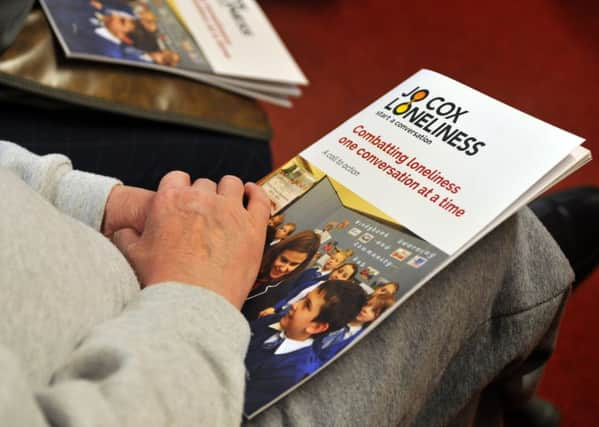Mike Adamson: Loneliness is a hidden epidemic we cannot afford to ignore


Just this month, new findings from NHS England further exposed the toll that loneliness and social isolation, experienced by people of all ages, is placing on our stretched healthcare system.
With stark warnings from the Jo Cox Commission on Loneliness, it’s clear that these urgent issues can clearly no longer be pushed aside.
Advertisement
Hide AdAdvertisement
Hide AdAt the British Red Cross, we believe loneliness is a crisis we cannot ignore. Every day, our staff and volunteers witness first-hand the devastating impact loneliness has on the lives of people across the UK and the additional strain placed on our public services.
Through our partnership with the Co-op, and as members of the Jo Cox Commission, the Red Cross has already been working to address this.
In response to this epidemic, we have created a network of Co-op funded Connecting Communities services available to adults of all ages who are experiencing or at risk of loneliness. The services provide timely, tailored help for people to reconnect when they are most at risk. For people like Barbara from York who told us: “Before you found me I felt like nobody cared, I felt forgotten about.”
From having a chat over a cup of tea to joining local community groups, this vital support is making a big difference to people, leading to a better-connected future and wider benefits for the community.
Advertisement
Hide AdAdvertisement
Hide AdOur pioneering research developed with the Co-op confirmed that loneliness is widespread, with over nine million adults of all ages reporting that they are always or often feel lonely. The Trapped in a Bubble report also found that 87 per cent of people in Yorkshire and the Humber believe loneliness to be a serious problem. Those surveyed also acknowledged the stigma around admitting to being lonely. This reinforces the sense that some people do not feel that loneliness is currently recognised as a ‘real issue,’ or one that they can legitimately ask for help with.
This perception that there are other social issues which are ‘more important’ or ‘more warranting of attention’ prevents many people from accessing support before a temporary feeling of loneliness becomes more chronic. This narrative, which is reminiscent of the early campaigning for mental health as a legitimate issue, is something that needs to change.
However, services like ours and those being delivered by other organisations across the country cannot solve the problem by themselves. Over the last 12 months, the Jo Cox Commission has encouraged us all to work together, but they also recognise that we still have a long way to go.
It was Jo who pioneered this sense of change, working tirelessly for a kinder and more tolerant world after experiencing loneliness herself at university and witnessing first-hand the impacts it had in her own constituency of Batley.
Advertisement
Hide AdAdvertisement
Hide AdAs the Commission’s recommendations are considered by the Government, the Red Cross and Co-op partnership have committed to driving forward their calls to action and proposals for wider society. Like Jo, we want to ensure that everyone experiencing loneliness has their voices heard.
To drive forward this work and achieve concrete change, 2018 needs to be a year of action. With this in mind, the Red Cross and Co-op will create a new Loneliness Action Group, dedicated to realising Jo’s vision of a less lonely, more connected world.
One of the aims of the Commission was to establish a national conversation about the scale and impact of loneliness in the UK. Engaging with our fellow partners from the Commission and other leading national expert organisations, the Action Group will continue this dialogue to provide a forum for change.
Working in tandem with an All Party Parliamentary Group on Loneliness and Social Isolation, co-chaired by Leeds West MP Rachel Reeves and South Ribble MP Seema Kennedy, the Action Group will focus on ensuring the calls to action set out in the commission’s final report are delivered and provide a platform for a range of partners to continue collaborating and broadening insight around this extensive issue.
Advertisement
Hide AdAdvertisement
Hide AdClearly there are no quick and easy solutions to complex issues like this but what we can do is work together as a society to use the power of kindness to alleviate the problem.
Perhaps it’s something as simple as starting a conversation with our neighbours or checking in with someone we haven’t spoken to for a while. Small but positive steps like these mean that we can go a long way. Together we can face loneliness head on, one conversation at a time, no matter how long it takes.
For more information on the charity’s action to tackle loneliness in Yorkshire, visit www.redcross.org.uk/lonely